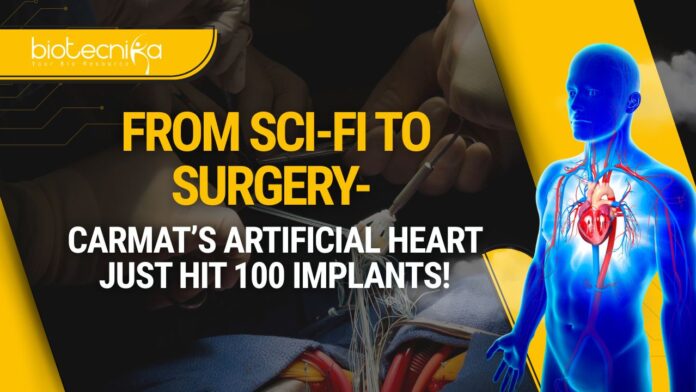CARMAT’s Artificial Heart Hit 100 Implants! From Sci-Fi to Surgery
The French medtech corporation CARMAT has declared its recent milestone of more than 100 successful Aeson implants. It is another step in its enduring dream of providing satisfactory permanent solutions for , with advanced biventricular heart failure, where both heart sites are severely compromised. On February 7th, 2025, the 99th as well as 100th successful implants were performed at the Lille and Dijon university hospitals, respectively. These two simultaneous interventions by the expert surgical teams of Professor Vincentelli and Professor Bouchot were carried out under the EFICAS clinical study framework, corresponding to the assessment of real-world effectiveness and safety of the Aeson device.
One of the important aspects that stands out in this milestone is the speed at which it has reached. The first 50 implants have been performed within the past 10 years, and by the end of 2023. Since early 2024, the pace of implants has accelerated, with 50 implants completed. This shows a steep acceleration and indicates an increase in clinical confidence in Aeson and a spread in hospitals all around Europe. The most significant highlight, however, is the device’s potential as a therapeutic alternative to conventional heart transplantation. When the donor hearts are not available or the patient can’t be subjected to transplantation due to some medical complications.
An increasing number of implants show that Aeson is slowly gaining acceptance in the healthcare sector. Now, professionals are using the device in their treatment protocols. Positive clinical outcomes as well as improved patient quality of life are contributing to this trend. A clear commercial vision supports CARMAT’s growth. The company aims to double its sales in 2025, as well as progressively position Aeson as a benchmark therapy in the treatment of end-stage heart failure. With a growing network of medical partners and clinical centers across Europe, CARMAT is well on its way to establishing a robust marketing presence in mechanical circulatory support.
Aeson is not just an artificial heart; it is a sophisticated bioprosthetic device designed to replicate the natural function of a human heart. It is made of biocompatible materials, embedded sensors, as well as adaptive pumping technology. Aeson also delivers a physiological, pulsatile blood flow while minimizing risks such as clot formation and stroke. Not like many existing mechanical heart devices, Aeson provides an auto-regulated response to the patient’s physical activity, making for a more seamless integration into the patient’s daily life. Its external power system as well as digital interface, allows for real-time monitoring as well as adjustment, making it a highly advanced solution in the world of heart support systems.
Stephane Piat, CEO of CARMAT, has expressed his pride as well as optimism in reaching this milestone, stating that about a year ago, they announced the milestone of 50 Aeson implants. Today, they are delighted to announce the 100th implant, demonstrating that Aeson meets a real therapeutic need. Stephane also mentioned that he would like to thank all healthcare professionals who are working with them on the extraordinary project, as well as the CARMAT teams for their unwavering commitment. Stephane also said he thinks about patients as well as their families, to whom Aeson brings real hope. Together, they contribute to shaping the future of advanced heart failure treatment by innovating an artificial heart.
The global burden of heart failure continues to increase, and the shortage of donor organs remains a critical challenge. CARMAT’s innovative work with Aeson offers a new beam of hope for patients around the world. With continued research, clinical trials, as well as collaboration with leading cardiac centers. CARMAT is poised to redefine the future of cardiac care, not only offering just life support but the possibility of restored life quality for those once considered beyond help.
CARMAT’s Artificial Heart Hit 100 Implants



























